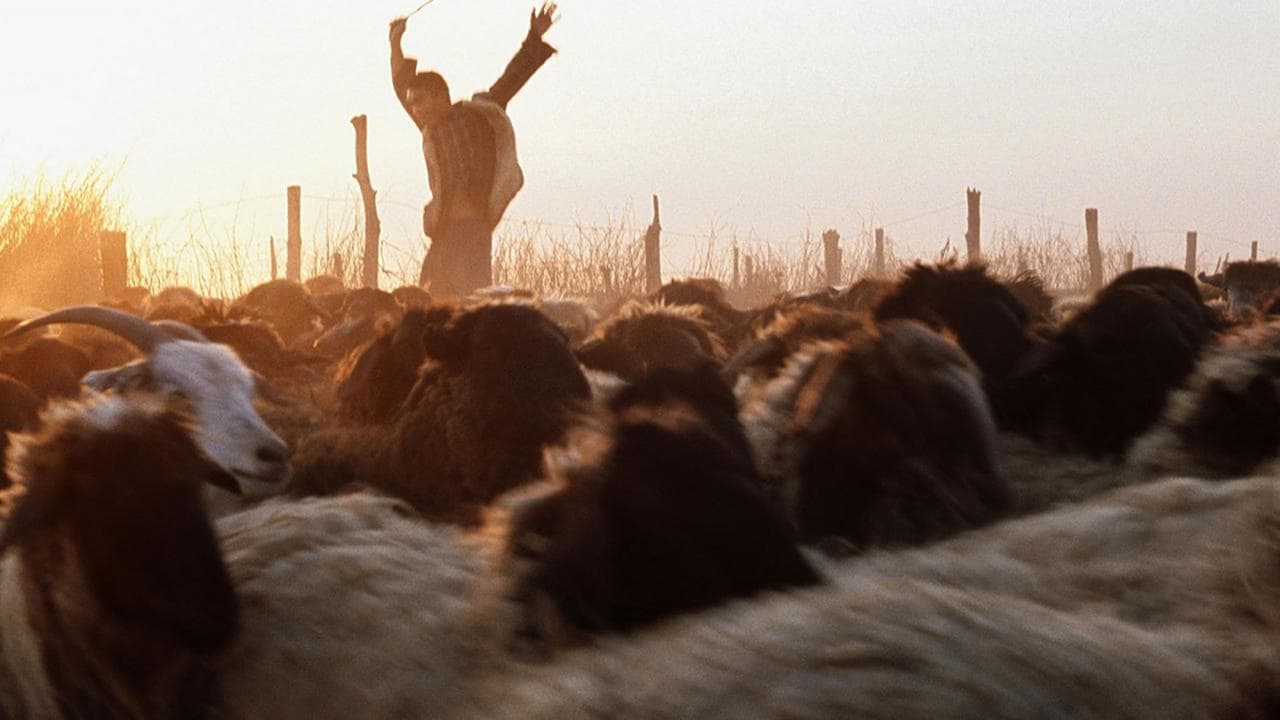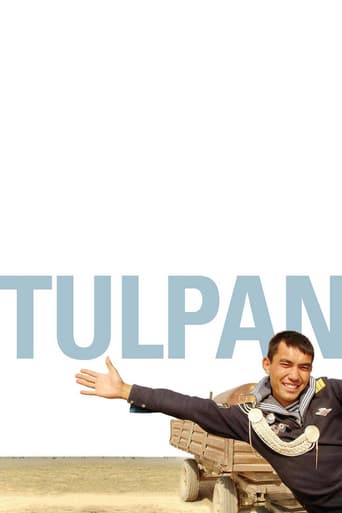GamerTab
That was an excellent one.
ReaderKenka
Let's be realistic.
Joanna Mccarty
Amazing worth wacthing. So good. Biased but well made with many good points.
Derry Herrera
Not sure how, but this is easily one of the best movies all summer. Multiple levels of funny, never takes itself seriously, super colorful, and creative.
lastliberal
The fact that this film won almost every award it was nominated for is of little consequence to the average film goer. It is about life on the Central Asian steppes of Kazakhstan. Yes, that Kazakhstan, but without Sasha Baron Cohen.Life here is very hard. There is not a tree in sight, and the wind whips the dirt around mercilessly. Asa just returned from his tour of duty in the Russian Navy, and we hear him tell his potential in-laws of the things he encountered. He is after the hand of Tulpan, the only available bride in the area. He wants to settle down and raise sheep, but he must have a wife. No deal. She thinks his ears are too big, but I believe it is mama that wants her to do more than just be a wife who cooks and cleans and has babies on the steppes.Asa keeps trying to win her as he tries to become a shepherd. He is not doing well at either.The funniest part of the film is the vet. You can't describe what he does with a cigarette, but you have to see it.It won't win any popularity contests, but it is worth seeing.
chuck-526
I watched Tulpan for the second time last night. It seems to me the movie is really about how different people react to wrenching changes, mostly by nursing a fantasy of some sort. Among other things Tulpan documents the _current_ way people and sheep use that steppe, which under the surface isn't very nice.As the "yurt" is a touchstone with the past, it's commonly retained even though it doesn't actually make much sense any more. These herdsmen move very infrequently (if at all), and these yurts are typically surrounded by outbuildings that look pretty permanent. What good really is a moving house if you don't move? The person who insists Asa must be married before getting any sheep is "Comrade Boss" (not brother-in-law Ondas - Asa and Ondas have their differences, but the assignment of sheep is not among them). Ondas and his family cannot move without approval from the Boss. The Boss controls the only veterinarian and most of the vehicles. The Boss tells Ondas he's responsible for every stillborn lamb. All this adds up to the current economic pattern in that area: herds of sheep belong to non-resident owners, who "contract" their care to the actual herdsmen. The herdsmen live sort of like their ancestors, but don't actually own most of the sheep, seldom move, and don't have all that much freedom.Daughter Beke (and also to some extent her mother and Asa's sister Samal) appear to cope with the dichotomy between the idealized life and the actual life of a herdsman's family by rather defiantly singing lots of folk songs. Perhaps the folk songs are just the most visible sign of fantasizing the old ways.Tractor driver Boni survives the dichotomy by diving deeply into a fantasy pastiche of music, sex, and wealth. He's the conduit to the "outside", and so is more worldly than the herdsmen he serves. But by more objective standards he's woefully uninformed too. At one point he speaks of bypassing the city and going directly to Sakhalin Island. Never mind that Sakhalin Island is in a different country thousands of miles away through several other countries.Asa appears to survive the dichotomy by remaining completely unaware of it. He admires a solar panel in a magazine, without ever realizing no herdsman could possibly afford such a thing. He admires a motorcycle in the magazine too, but without ever reflecting such a thing would be useless without a reasonably accessible supply of gasoline. He compliments Tulpan on wanting to go to college at the same time he wants her to marry him, without any sense that it might be difficult to do both. The scene he draws on his collar is of an idealized herdsman with healthy children (not the half-crazy kids he actually lives with), his own herd of sheep, more wealth than any real herdsman ever had, and the freedom to move wherever he wishes whenever he wishes.Brother-in-law Ondas clings to the old ways even though they don't quite add up any more. He invests a lot of time and effort in quixotic visits to Tulpan's yurt that are doomed from the start. He doesn't know his "neighbors". Although they politely receive him, they apparently weren't ever expecting a marriage proposal visit and don't know quite how to deal with one. Ondas's gift looks like an electric light fixture -with lots and lots of little pieces to keep clean- intended for an elegant room. It wouldn't be of any use in a yurt with dust (and a little smoke?) and no electricity. And he talks of giving a large number of sheep too, never mind that the sheep don't seem to be his to give, or that talking of a large number of sheep in the context of marriage seems irrelevant. The scenic views of far away horizons and sparse vegetation portray what I'd call a semi-desert. Just try to imagine a "tulip" sprouting up between those tufts. If you can imagine it at all, it will look horribly out of place. Likewise the tulip Asa draws into the scene on his collar is in a different style and colors than the rest. It's added on, but not integrated.
jennyhiswife
I loved the epic documentary "Saltmen of Tibet," so I am a fan of dusty low-plot movies about someplace I'll never go. But TULPAN was terrible! I can't believe I sat through the whole thing.The assault on the senses, the constant noise of that bratty kid singing, that other kid shouting, the wind, the camel stampede or sheep stampede . . . what a beating you take just sitting there! The hideous scene of the children vying for the privilege of squeezing blackheads on their father's back? Honestly! Too bad we didn't get to watch somebody squatting behind a clump of dry grass.The depressing anti-heroism of Asa, a fool and a liar. Thinks he loves/wants a particular woman because it turns out she's his last hope of getting a herd of sheep. Now THAT is a courtship.The falseness of the animal scenes and story lines. If those ewes are malnourished, you sure can't tell from their energetic behavior. So don't ask me to believe that's why they're losing their lambs. If they're so malnourished, why are the lambs carried to full term and coming out more or less the right size? And how come, since much of the action revolves around moving the animals to pasture, we never once not once see a sheep or a cow or a camel EAT anything? And what's up with that healthy ewe delivering a healthy baby needing assistance from the idiot? Baloney.One thing that came through so very clearly is the horror of being a woman on that steppe. Stuck with cooking, cleaning, children. Tulpan wants to go to college and her mother violently chases away the suitor, presumably to spare her the life she, the mom, has endured. Asa's sister and niece are in some kind of cahoots to torment Ondas. I have to believe the filmmaker understands what he is showing, so maybe this whole horrible experience was a kind of feminist critique of a dying way of life that can't breathe it's last soon enough.So disappointing! The trailer was so wonderful! :(
mmunier
For our group it was our 3rd visit to this "area", and out of the four of us, three found it was one too many. A few years back we started with "The Weeping Camel", having reasonably enjoyed it later on we also saw "The cave of the yellow dog" (I hope I got those titles right!) Then "Tulpan" came with such raving reviews that we had to see it too. Well we did and it was a little like a sentence. I couldn't say it was like watching grass growing for the obvious reason (no this is not a spoiler!) Usually though I enjoy revisiting places I "have been" before but somehow it did not work anymore for me this time.... and now this is THE SPOILER: it was not much different than the two previously mentioned stories. That's it - how long can you watch people living in a confine area where very little happens. Yes the panorama has something, yes it's poetic but no it's not for me anymore.When I read some of the reviews here or elsewhere I think of a funny event that happened at a local market where a man was demonstrating a gadget to get your car running at a high performance with little fuel. It was amazing and very convincing with a huge running engine being part of the demonstration. I did buy two of these gadgets! As I continued to wander about the market I bumped in something even more amazing...The same person was now demonstrating potato peelers and with the same verbal "dexterity"!Now, this could be another spoiler... There was a certain goat that made me ponder whether it could have had some very symbolic representations and made me feel that perhaps we, as an audience, were the subject of some of these representation. Perhaps it's safer to go and see some movies without reading too much about or keep a check on expectation. Perhaps it could be wise to check one's mood as well on the day if you have reason to believe that it could affect your perception. But first timers you should enjoy it because it still is special mm

